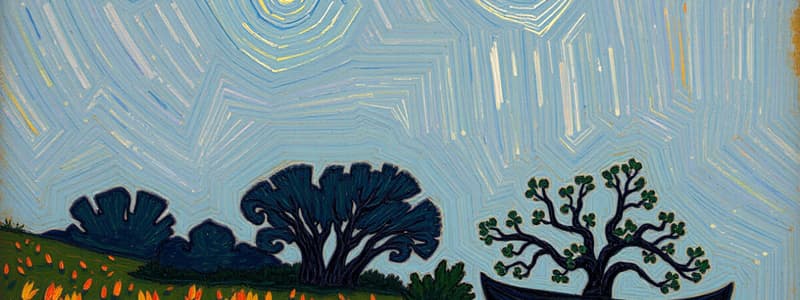Podcast
Questions and Answers
What is magnetism?
What is magnetism?
The force exerted by magnets when they attract or repel each other.
What is magnetism caused by?
What is magnetism caused by?
The motion of electric charges.
What causes magnetism inside the atom?
What causes magnetism inside the atom?
The electrons that are in constant motion around the nucleus of an atom.
Why are unpaired electrons more significant than paired electrons in terms of magnetic properties?
Why are unpaired electrons more significant than paired electrons in terms of magnetic properties?
What causes a material to be classified as 'ferromagnetic'?
What causes a material to be classified as 'ferromagnetic'?
Name some examples of ferromagnetic materials.
Name some examples of ferromagnetic materials.
What is a magnetic domain?
What is a magnetic domain?
What is basalt and how do scientists use it to determine the direction of Earth's magnetic field over time?
What is basalt and how do scientists use it to determine the direction of Earth's magnetic field over time?
How does geomagnetism help scientists understand the motion of Earth's plates?
How does geomagnetism help scientists understand the motion of Earth's plates?
What is magnetic declination and what causes it?
What is magnetic declination and what causes it?
What do the terms 'geographic north' and 'magnetic north' mean?
What do the terms 'geographic north' and 'magnetic north' mean?
When will magnets attract or repel each other?
When will magnets attract or repel each other?
What happens when you cut a magnet in half?
What happens when you cut a magnet in half?
What are magnetic field lines?
What are magnetic field lines?
What is the right hand rule?
What is the right hand rule?
What is the unit in a magnetic field?
What is the unit in a magnetic field?
What are permanent magnets?
What are permanent magnets?
In a bar magnet, where is the magnetic field strongest?
In a bar magnet, where is the magnetic field strongest?
In a bar magnet, where are the strongest external magnetic fields?
In a bar magnet, where are the strongest external magnetic fields?
What is the direction of the electric field of a point charge from a positive charge?
What is the direction of the electric field of a point charge from a positive charge?
Why do electrons act like microscopic magnets?
Why do electrons act like microscopic magnets?
What are geomagnetic poles?
What are geomagnetic poles?
What is the magnetosphere?
What is the magnetosphere?
What is solar wind?
What is solar wind?
The magnetosphere protects the earth from ______________, but some leak through and become trapped.
The magnetosphere protects the earth from ______________, but some leak through and become trapped.
How are auroras produced?
How are auroras produced?
What is an electromagnet?
What is an electromagnet?
What is electric current?
What is electric current?
Flashcards are hidden until you start studying
Study Notes
Magnetism Overview
- Magnetism: A force by magnets that can attract or repel each other.
- Caused by the motion of electric charges.
Atomic Magnetism
- Magnetism at the atomic level is due to electrons moving around the nucleus, producing a magnetic field.
- Unpaired electrons create a magnetic field, while paired electrons do not influence magnetic properties.
Ferromagnetism
- Ferromagnetic materials (e.g., iron, nickel, cobalt) can be strongly attracted to magnetic fields and retain magnetism after the external field is removed.
- Magnetic domains: Small regions in ferromagnetic materials that align to produce magnetism.
Geological Applications
- Basalt: A rock formed from solidified lava, which records Earth's magnetic field direction during solidification, useful for tracking historical magnetic field changes.
- Geomagnetism aids in understanding tectonic plate motion, as lava emerging from mid-ocean ridges records the magnetic field, acting like a tape recorder.
Magnetic Measurements
- Magnetic declination: The angle between magnetic north (the direction of a compass needle) and true north.
- Geographic North is the true north, while Magnetic North refers to the orientation of the Earth's magnetic field.
Magnet Interactions
- Magnets attract or repel each other based on their poles: opposite poles attract, like poles repel.
- Cutting a magnet in half results in two smaller magnets, each with their own north and south poles.
Magnetic Field Properties
- Magnetic field lines illustrate the magnitude and direction of a magnetic field, represented as closed loops.
- The strongest magnetic field in a bar magnet is found inside the material, while the strongest external fields are near the poles.
Electromagnetism
- Permanent magnets are made from ferromagnetic materials and created by moving charges.
- An electromagnet consists of a coil with a soft iron core that acts as a magnet when an electric current flows through it.
Electric Fields and Charges
- The electric field direction from a positive point charge is radially outward.
- Electrons behave like microscopic magnets due to their movement around the atomic nucleus, generating electric currents.
Earth's Magnetosphere
- The magnetosphere encompasses the area surrounding Earth affected by its magnetic field, protecting it from solar wind particles.
- Although the magnetosphere blocks most solar wind, some particles can leak through, becoming trapped.
- Auroras occur when solar wind particles collide with gas atoms in the upper atmosphere near geomagnetic poles.
Units of Measurement
- The unit of measurement for magnetic fields is the Tesla (T).
Right Hand Rule
- A technique, known as the right hand rule, is used to determine the direction of an angular motion vector in physics.
Studying That Suits You
Use AI to generate personalized quizzes and flashcards to suit your learning preferences.




